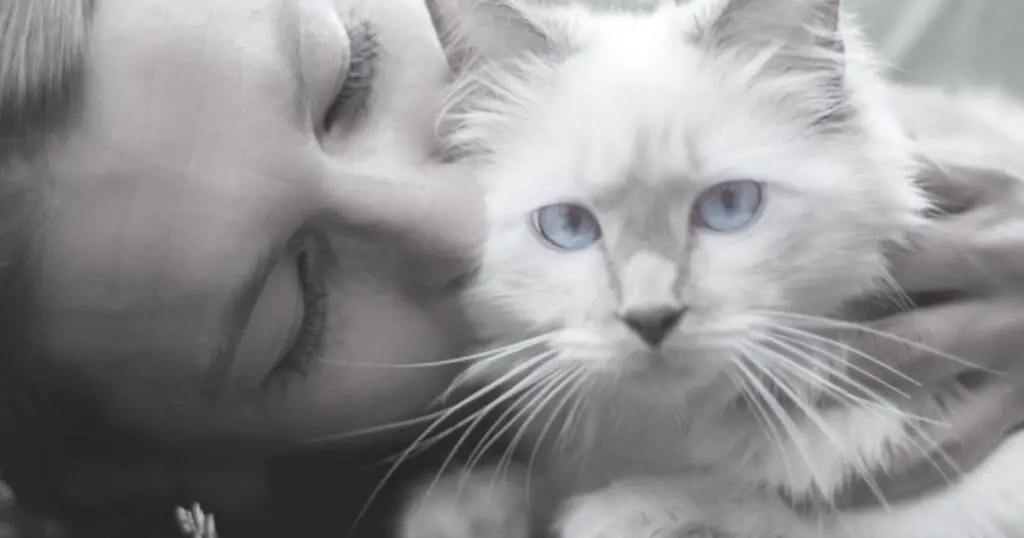Should you keep your cat in at night? If you are a cat owner, you may be wondering whether you should keep your feline friend indoors at night.
In this blog post, we will explore the question of whether you should keep your cat in at night and provide you with information on the topic.
We will cover topics such as the risks and benefits of keeping your cat indoors at night, how to create a safe and comfortable indoor environment for your cat, and how to train your cat to stay indoors at night.
If you are a new cat owner looking for advice on how to keep your feline safe and happy, or a long-term cat parent looking for tips on how to manage your cat’s night-time activities, this blog post has something for everyone.
So, grab a cat toy and let’s dive into the topic of keeping your cat in at night.
What Are The Risks Of Letting Cats Roam Outdoors At Night?
Cats are more likely to be injured or sadly killed in the night.
Depending on the time of year, the weather could cause your cat to put themselves at risk. Your cat could end up jumping in to a shed to escape cold or wet weather and end up being locked in or cornered, too afraid to leave.
We are pretty sure that when our cat went missing in 2017, that she was locked in a shed. Eventually she came out skinny and oblivious to the worry caused, a week after she went missing.
Risk 1: Weather
The cold itself could be a risk, sure cats are covered in fur, but snow, rain or a serious drop in temperate especially if your cat is older or not 100%, could end up in them becoming sick or not coming back.
Risk 2: Roads
Cats can be involved in road traffic accidents.
During the night during cats are more at risk due to low visibility, some drivers driving faster in the night due to the perceived safety of there being fewer cars on the road could unknowingly catch your cat off guard, not giving them enough time to react.
Risk 3: Cats are Curious
Cats are more likely to go places in the night they wouldn’t during the day. For the same reason why drivers feel safer driving at night, cats will attempt to cross roads or go in gardens/areas that are quieter in the darkness.
Your cat is nocturnal and will be more active during the night, remember this is the same for all cats.
Risk 4: Other Cats & Predators
Cats are top of the food chain, but there are other predators out there competing for the same prey.
A cat may be a threat to other, larger predators.
It’s easy for encounters with other cats in the night to turn in to fights, these fights can result in injuries to your cat. The close contact with other cats, bites and scratches could pass on diseases or infections.
Depending on who you believe, other animals like foxes, bob cats or other predators will be in the same mindset as your cat. And may come cross each other leading to injuries or worse.
Risk 5: Humans
Lastly one of the most upsetting reasons is, humans.
Although rare, sadly some people of the night can have bad intentions or commit horrible impulsive actions, I’m sure you’ve heard stories of cats being picked up and taken away, or worse. One hit or kick from someone can do serious, even deadly harm to a cat. Is your cat overly friendly?
Your neighbours, you love cats but they may not. Loud cat standoffs in the night or cats setting off security lights can really get to some people.
They may choose to attempt breaking up cat standoffs or discouraging cats from their property in the night.
Is There Anything I Can Do To Keep My Cat Safe Outdoors At Night?
If your cat is used to going outside at night without obstruction or through habit, you are going to have a hard time keeping them in. Cats will be persistent in their attempts to make you understand that they want to go out.
The stress caused to a cat by keeping them in if they are a long time outdoor cat can make them sick, bringing on things like diarrhoea, vomiting and aggression.
There are few things you can do to try to improve the situation,
Safety Tip 1: Give Your Cat A Reflective Collar
Giving your cat a reflective collar can provide several benefits, especially if you allow them to roam outside at night.
One of the primary benefits of giving your cat a reflective collar is that it can increase their visibility.
A reflective collar will reflect light, making your cat more visible to drivers and other people who may be outside at night. This can help to reduce the risk of accidents and increase your cat’s safety when they are outside.
Additionally, a reflective collar can make it easier for you to locate your cat if they wander off or get lost in the dark.
Safety Tip 2: Consider Using A Catio
This will give your cat a space outside so they can bask in the darkness. A happy middle ground!
These special spaces allow our beloved pets to enjoy the outdoors without any risks. No matter the size of your outdoor space – whether it’s a small balcony or a large backyard – there’s a cat enclosure that’s perfect for you and your furry friend.
See also: Best Catios for Indoor Cats
Safety Tip 3: Make sure your cat is fully vaccinated
One essential aspect of safeguarding your cat’s health is to ensure that they are fully vaccinated.
Vaccinations are vital in protecting cats against a range of diseases and illnesses that can be harmful or even fatal to them.
Cats may roam further at night and come into contact with other cats carrying diseases that you cat may catch.
Also, stay up-to-date with flea and worm treatments.
Safety Tip 4: Consider a cat tracker – preferably with GPS & a good battery
This will ensure you know where your cat has been and where they are now!
If you’re a cat owner who allows your cat to roam outside at night, you may have concerns about their safety and whereabouts.
While it’s natural to want to give your cat the freedom to explore and play, it’s important to ensure that they are safe and secure when doing so. This is where a GPS cat tracker can come in handy.
We’ve covered GPS Trackers a lot on this blog – our cats wear a TabCat Tracker indoors and a Weenect 2 outdoors.
Read our guide of the best trackers here.
Safety Tip 5: Limit Outside Time To Daylight Hours
Plan your cats day, let them out in the morning, and get them in before it starts to go dark, build routines using treats and positive reinforcement. making them want to come back more often if they do decide to wander.
Your cats may learn to stay closer to home, they will be more attached to the territory inside your home and garden rather than establishing a wider territory. Also they will remember that you will likely be coming for them and may start heading home at a particular time.
Although I must point out, the reason I say that you should get them in before dark, as I have experienced with my cats. Is that they really don’t want to come back in when it’s dark.
It can be like a switch has been flipped, not all the Dreamies and laser pointers in the world could get them to come back and I would have to wait until they decide to come back!
Helicopter parents, am I right?
Safety Tip 6: Get A Secure Cat Flap
If your cat does need to get inside, that may be to escape danger or have something to eat or drink, a secure cat flap will allow them to freely do this with no fear of other cats getting in.
This may also encourage your cat to stay closer to home rather than have to find somewhere else that’s “safe”.
Certain cat flaps can be programmed to unlock when it detects your cat’s microchip, but remain locked when other cats approach your door.
These are cat flaps that rely on widely-used pet microchip identifiers instead of using apps, collars or tags to allow your cat to gain access to your home without you having to act like a door-opening slave.
Cat microchips are routinely administered by veterinarians to identify lost cats by registering a small electronic chip with the owner’s name, address and phone number.
The microchip will have a serial code that is registered to you, so you can move house and update your address on your cat’s chip without needing to get it replaced.
Are Cats Missing Out If You Keep Them In? – The Cons of Keeping Cats In Every Night
As a cat owner, it’s natural to want to keep your feline friend safe and sound by keeping them indoors every night.
After all, it’s a well-known fact that cats can be prone to accidents and injuries when they roam free in the great outdoors.
However, while keeping your cat inside may seem like the safest option, it’s important to consider whether they might be missing out on some of the benefits of being an outdoor cat.
Cats Yearn To Be Outdoors
One of the biggest cons of keeping your cat inside every night is that they may miss out on some of the mental and physical stimulation that comes with being an outdoor cat.
Cats are natural hunters, and they need to be able to explore, climb, and play in order to keep their minds and bodies active and healthy.
When kept inside for extended periods of time, they may become bored and sedentary, which can lead to health problems such as obesity and behavioral issues like anxiety and aggression.
Another disadvantage of keeping your cat inside is that they may miss out on the sensory experiences that come with being outside. Cats have a highly developed sense of smell, and they rely on their sense of smell to navigate and explore their environment.
By keeping them inside, you’re limiting their exposure to new smells, which can lead to boredom and frustration.
Keeping your cat inside can also lead to a lack of socialization.
Cats are naturally social animals, despite what you may think, they enjoy interacting with other cats and animals (even if it’s just watching them). By keeping your cat indoors all the time, they may miss out on the opportunity to socialize with other felines and form bonds with other animals.
The risks associated with letting your cat outside can be mitigated by taking certain precautions, such as microchipping your cat, keeping up with vaccinations, and supervising their outdoor time.
By allowing your cat to spend some time outside, you’re giving them the opportunity to explore, play, and socialize, which can lead to a happier and healthier feline companion.
While it’s important to keep your cat safe, it’s equally important to consider their physical and emotional needs. Keeping your cat inside every night may seem like the safest option, but it can lead to boredom, frustration, and other health and behavioral problems.
By providing your cat with the opportunity to explore and play outside, you’re helping them live a more fulfilled and enriched life.
Final Thoughts – Should You Keep Your Cat(s) In At Night?
So, should you keep your cat in at night?
As we wrap up our discussion on whether you should keep your cat in at night, let’s take a moment to reflect on what we’ve learned. It’s a decision that ultimately depends on your personal circumstances and preferences, as well as your cat’s well-being and natural instincts.
Although there are undeniable benefits to keeping your cat indoors, such as avoiding accidents and fights, you should also consider your cat’s need for stimulation and exercise. After all, cats are natural hunters and explorers, and they may become bored and unhappy if confined to a limited space.
On the other hand, if you decide to let your cat roam outside, you’ll need to take precautions to ensure their safety, such as getting them microchipped and equipping them with a collar that has your contact information.
Remember, your cat is your responsibility, and it’s up to you to make the best decision for their happiness and well-being. So take some time to weigh the pros and cons, and think about what’s best for both you and your feline companion.



